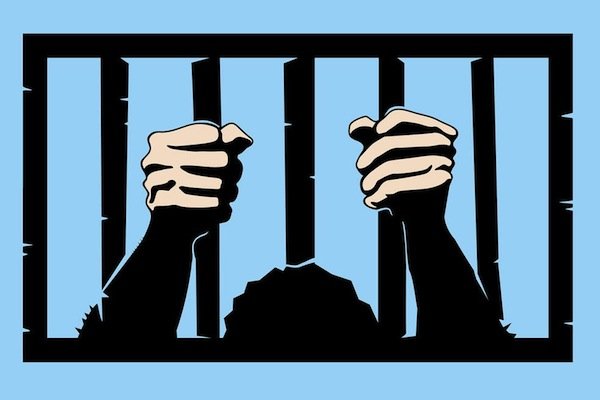 The United States incarcerates 25% of the world’s incarcerated people yet is only 4% of the world’s population. Mass incarceration in the U.S. is clearly driven by systemic racism, as documented by Michelle Alexander in her book, The New Jim Crow: Mass Incarceration in the Age of Colorblindness:
The United States incarcerates 25% of the world’s incarcerated people yet is only 4% of the world’s population. Mass incarceration in the U.S. is clearly driven by systemic racism, as documented by Michelle Alexander in her book, The New Jim Crow: Mass Incarceration in the Age of Colorblindness:
- “The United States imprisons a larger percentage of its black population than South Africa did at the height of apartheid” (6).
- “In some states, black men have been admitted to prison on drug charges at rates twenty to fifty times greater than those of white men” (6).
- “One in three young African American men will serve time in prison if current trends continue, and in some cities more than half of all young adult black men are currently under correctional control—in prison or jail, on probation or parole” (8).
Turning the tide on mass incarnation is starting to happen, as evidenced by the collaboration of progressives and conservatives in the Coalition for Public Safety (www.coalitionforpublicsafety.org; partners include the ACLU, Center for American Progress, FreedomWorks, and Koch Industries).
There are three areas in which individuals and churches can get involved:
1) engagement … 2) education … 3) advocacy
1) Engage the people and resources already at work:
- Disciple Bible Outreach Ministries (disciplebibleoutreach.org), soon entering Stateville Correctional Center
- Education Justice Project (www.educationjustice.net); “EJP organizes educational programming at Danville Correctional Center through the University of Illinois.”
- Contact Info: info@educationjustice.net; 217-300-5150
- Kairos Prison Ministry of Illinois (kairosofillinois.org)
- Contacts: Norm Reuter
- Kairos Outside: Sandra Major
- Michelle Alexander, The New Jim Crow: Mass Incarceration in the Age of Colorblindness
- Study Guide and Call to Action (free e-book)
- An Organizing Guide
- Jens Soering, The Convict Christ: What the Gospel Says About Criminal Justice
- Book includes excellent questions for small group study
- Prison Lectionary, PrisonLectionary.net
- A virtual space devoted to biblical interpretation by artists and authors incarcerated in jails or prisons in the United States; a forum for the voices of prisoners—who are the most authoritative witnesses to incarceration; a repository of information for the study the Revised Common Lectionary texts and other Scriptures
- Websites of exemplary organizations:
- The Sentencing Project (sentencingproject.org)
- Established in 1986, The Sentencing Project works for a fair and effective U.S. criminal justice system by promoting reforms in sentencing policy, addressing unjust racial disparities and practices, and advocating for alternatives to incarceration.
- Families Against Mandatory Minimums (famm.org)
- FAMM (Families Against Mandatory Minimums) is a nonprofit, nonpartisan organization fighting for smart sentencing laws that protect public safety.
- Prison Policy Initiative (www.prisonpolicy.org)
- The Prison Policy Initiative challenges over-criminalization and mass incarceration through research, advocacy, and organizing. We show how the United States’ excessive and unequal use of punishment and institutional control harms individuals and undermines our communities and national well-being.
- Witness to Innocence (witnesstoinnocence.org)
- Witness to Innocence is the nation’s only organization dedicated to empowering exonerated death row survivors to be the most powerful and effective voice in the struggle to end the death penalty in the United States.
- General Commission on Religion and Race (GCORR.org)
- The General Commission on Religion and Race was created by The United Methodist Church in 1968 to address the turbulent and exciting unrest, disease, hope and new possibilities unleashed as legalized racial segregation and separation were being dismantled in church and society.
- The Sentencing Project (sentencingproject.org)
- Develop an educational piece similar to one prepared by the Mennonite Central Committee’s “Washington Memo,” especially the last two pages as a single, double-sided page, or just use this one from the MCC with their permission.
- This MCC newsletter is also in webpage form here
- Policy princicples
- Facts
- The so-called “Elderly” bill in Illinois, HB 3668, “Provides that a committed person who is at least 50 years of age and who has served at least 25 consecutive years of imprisonment in a Department of Corrections institution or facility may petition the Prisoner Review Board for participation in the Elderly Rehabilitated Prisoner Sentence Modification Program.”
- End the Bed Quota Campaign (www.detentionwatchnetwork.org/EndTheQuota): “Congressional appropriations language on the U.S. Immigration and Customs Enforcement’s (ICE) detention budget states that ‘funding made available under this heading shall maintain a level of not less than 34,000 detention beds.'”
- The Smarter Sentencing Act (famm.org/s-1933-smarter-sentencing-act-2017-115th-congress/): “fairer, less costly minimum terms for nonviolent drug offenders;” Illinois Senator Dick Durbin is one of the sponsors of this bill.



